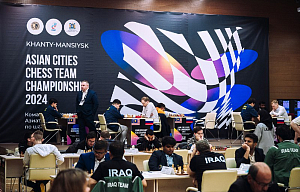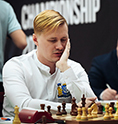5 September 2015
Berik Balgabaev: Future Chess Elite Gathers in Khanty-Mansiysk
FIDE president's advisor answered Vladimir Barsky's questions.
"The opening ceremony, like all other events here in Khanty-Mansiysk, was organized at a high level. The drawing of lots was its central part: we learned that the Elo rating favorites and all the odd numbers in boys' and girls' tournaments would play their games as White.
"The U-20 world championships are unique in their own way because they last 13 rounds, while modern tournaments are often shorter: 7, 9 or 11 rounds. This means that this competition requires very good physical preparation as well as purely chess preparation. Virtually the entire modern chess elite has been hardened in the furnace of the U-20 world championships, and almost all world champions passed through this tough school. So it won't be an exaggeration to say that some of those who gathered in Yugra's capital will soon become part of the chess elite, or maybe even fight for the chess crown."
"Whom do you view as the favorite in the tournament?"
"There are quite a lot of them, it's difficult to single anyone out. I can only mention the Russian Champion Alexandra Goriachkina, who decided this time to abstain from playing in the women's tournament and to cross swords with the young men."
Berik Balgabaev speaking at the opening of the U-20 World Championship in Khanty-Mansiysk. Alexei Putin, deputy governor of the Khanty-Mansiysk Autonomous Region ― Ugra, is on the right.
"Berik, on the last day of the summer you participated in a meeting of the organizing committee of the Women's World Championship Match between Mariya Muzychuk and Yifan Hou. What issues were discussed in Kiev?"
"As you know, this organizing committee was set up this July under a decree by Ukrainian President Petro Poroshenko. Chief of the President's Administration Boris Lozhkin was appointed as chairman of the Organizing Committee, and he chaired the meeting. Representatives from various government ministries and agencies as well as NGOs were present there. Viktor Kapustin, president of the Ukrainian Chess Federation, made a long report on the work that had been done. Submitting a bid for holding a match always implies certain financial guarantees, and Kapustin explained what legal steps had to be taken.
"Ukraine received a contract from FIDE; according to Kapustin, it will be signed within the next few days. The first part of the payment ($100,000) is already on the way to FIDE.
"A precise match schedule has been determined: the opening ceremony is to take place on March 1, 2016; the first game on March 2; and the tie-break, if necessary, on March 18. The event will be held in Lviv. A meeting of the working group will be held this week to review and discuss several possible venues for the match."
"Can the match be held in the famous Lviv opera theater?"
"Of course, we are all for it, but we need to check whether other events, spectacles, etc. have already been scheduled in this beautiful theater for March. A meeting of the match's organizing committee will be held in late September.
"We also met with Kiev Mayor Vitali Klitschko, and he said he would like to have one of women's Grand Prix stages held in the Ukrainian capital; the relevant bid should be submitted to FIDE. The preliminary schedule is next October. Klitschko added that chess would be introduced as part of the curriculum in all Kiev schools, for now as an optional subject. He is also going to install field chess boards in 10 Kiev parks so everyone can play there, and dreams about equipping each of the 500 Kiev schools with at least one chess class."



















